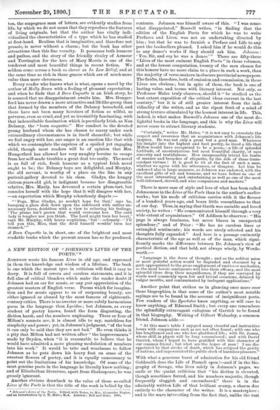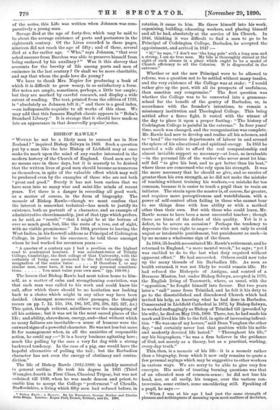A NEW EDITION OF "JOHNSON'S LIVES OF THE POETS."*
JOHNSON wrote his famous Lives in old age, and expressed in them the knowledge and wisdom of a lifetime. The book is one which the merest tyro in criticism will find it easy to decry. It is full of errors and careless statements, and it is full also of critical blunders which make the reader doubt if Johnson had an ear for music, or any just appreciation of the greatest masters of English verse. Poems which for imagina- tion and for music appear to us of surpassing beauty, are either ignored or abused by the most famous of eighteenth- century critics. There is no sweeter or more subtly harmonious poem in the language than Lycidas ; but Johnson, as every student of poetry knows, found the form disgusting, the diction harsh, and the numbers unpleasing. Three or four of Milton's sonnets are, it is almost idle to say, matchless for simplicity and power; yet, in Johnson's judgment, "of the best it can only be said that they are not bad." He even thinks it a pity that Milton had not written after "the improvements" made by Dryden, when "it is reasonable to believe that he would have admitted a more pleasing modulation of numbers into his work." It would be trite and wearisome to follow Johnson as he puts down his heavy foot on some of the sweetest flowers of poetry, and it is equally unnecessary to point out the limitations of his knowledge. Of some of the most genuine poets in the language he literally knew nothing; and of Elizabethan literature, apart from Shakespeare, he was grossly ignorant.
Another obvious drawback to the value of these so-called Lives of the Poets is that the title of the work is belied by the
* Johnson's Lives of the Poets. Edited, with Notes, by Mrs. Alexander Napier, and an Introduction by J. W. Hales, M.A. Loudon: Bell and sow. 1890.
contents. Johnson was himself aware of this. "I was some- what disappointed," Boswell writes, "In finding that the edition of the English Poets for which he was to write
Prefaces and Lives, was not an undertaking directed by him ; but that he was to furnish a Preface and Life to any
poet the booksellers pleased. I asked him if he would do this to any dunce's works if they should ask him. Johnson : Yes, Sir, and say he was a dunce." There are fifty-three "Lives of the most eminent English Poets " in these volumes, and at the lowest computation, twenty of the men chosen for this honour have no more claim to a place in such a work, than the majority of verse-makers in obscure provincial newspapers. The faults, therefore, both of omission and commission, in these Lives are obvious ; but in spite of them, the book is one of lasting value, and teems with literary interest. Not only, as Professor Hales truly observes, should it "be studied as the best extant exposition of the critical ideas current in the last century," but it is of still greater interest from the indi- viduality of the writer, and as the ripest fruit of a mind of strong texture stimulated by the keenest interest in life. This, indeed, is what makes Boswell's Johnson one of the most de.
lightful books in the language, and this is why the Lives will never cease to attract literary students.
"Certainly," writes Mr. Hales, "it is not easy to overstate the respect and reverence that an acquaintance with Johnson's life inspires. He was not only a great but a good man. Whatever his insight into the highest and best poetry, he lived a life that Milton would have recognised to be a poem,—a life of splendid fortitude, of unostentatious but most bountiful charity, of rare sincerity and truthfulness. How inexpressibly trivial his faults of manner and breaches of etiquette, by the side of these trans- cendent virtues ! It is good to sit at the feet of such a man, whether we agree with his utterances, or disagree. Let him be endowed also in large measure, as Johnson was endowed, with the excellent gifts of wit and humour, and we have before us one of the most interesting and entertaining as well as one of the most well-informed, shrewd, and wise companions and masters."
There is more ease of style and less of what has been called Johnsonese in the Lives of the Poets than in the author's earlier works ; but his mode of criticism carries with it the flavour of a hundred years ago, and bears little resemblance to that of our day. Thus, in saying that Garth was sociable and loved
society, he writes : "He communicated himself through a very wide extent of acquaintance." Of Addison he observes : "His
page is always luminous, but never blazes in unexpected splendour ;" and of Prior : "He has no careless lines or
entangled sentiments ; his words are nicely selected and his thoughts fully expanded." And here is a passage eminently characteristic of the age as well as of the man, which signi- ficantly marks the difference between Dr. Johnson's view of poetical diction, and that held, not always wisely, by Words- worth :—
" Language is the dress of thought ; and as the noblest mien or most grateful action would be degraded and obscured by a garb appropriated to the gross employment of rustics or mechanics, so the most heroic sentiments will lose their efficacy, and the most splendid ideas drop their magnificence, if they are conveyed by words used commonly upon low and trivial occasions, debased by vulgar mouths, and contaminated by inelegant applications."
Another point that strikes us in glancing once more over these biographies, is that some of the author's most notable sayings are to be found in the account of insignificant poets.
Few readers of the Spectator know anything, or will care to know anything, of Edmund Smith ; but every one remembers the splendidly extravagant eulogium of Garrick to be found in that biography. Writing of Gilbert Walmsley, a common friend, Johnson adds :—
" At this man's table I enjoyed many cheerful and instructive hours with companions such as are not often found ; with one who has lengthened and one who has gladdened life ; with Dr. Tames, whose skill in physic will be long remembered ; and with David Garrick, whom I hoped to have gratified with this character of our common friend : but what are the hopes of man ! I am dis- appointed by that stroke of death, which has eclipsed the gaiety of nations, and impoverished the public stock of harmless pleasure.'
With what a generous burst of admiration for his old friend Goldsmith does the Life of Parnell open !—and if in the bio- graphy of Savage, who lives solely in Johnson's pages, we
smile at the quaint criticism that "his diction is elevated, though sometimes forced, and his numbers majestic, though frequently sluggish and encumbered," there is in the admirably written Life of that brilliant scamp, a charm due entirely to the character of the writer. It is a masterpiece ; and, is the mere interesting from the fact that, unlike the rest of the series, this Life was written when Johnson was com- paratively a young man. Savage died at the age of forty-five, which may be said to be about the average existence of poets and poetasters in the eighteenth century. Of the Lives recorded in these pages, nineteen did not reach the age of fifty; and of these, several died at a far earlier age. "Who," says Johnson, "that ever asked succour from Bacchus was able to preserve himself from being enslaved by his anYiliary P" Was it this slavery that accounts for the brevity of life among poets and men of eminence in the last century ? Or shall we be more charitable, and say that whom the gods love die young ?
We have to thank Mrs. Napier for producing a book of which it is difficult to grow weary, in so satisfactory a form. Her notes are ample, sometimes, perhaps, a little too ample; but they are marked by careful research, and display a wide extent of reading. The text, printed from the edition of 1783, is "absolutely as Johnson left it ; " and there is a good index, —an indispensable requisite to all works of this class. We may add that this famous English classic appears in " Bohn's Standard Library." It is strange that it should have made so late an appearance in that deservedly popular:series.











































 Previous page
Previous page